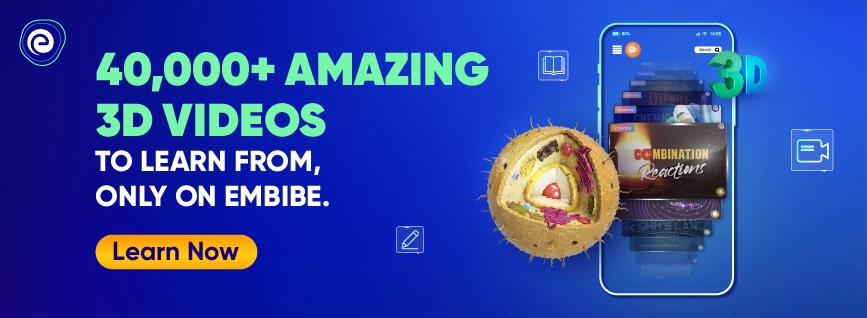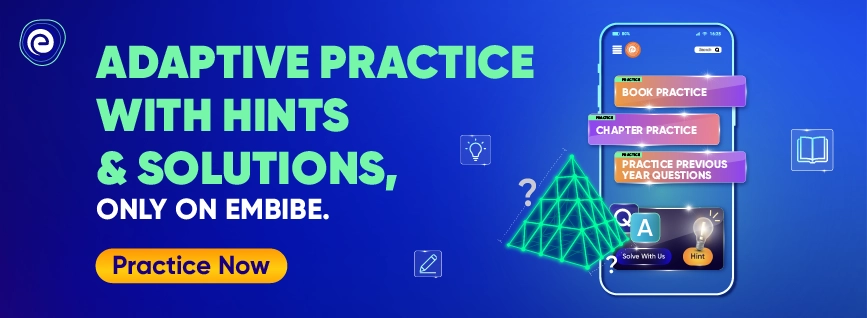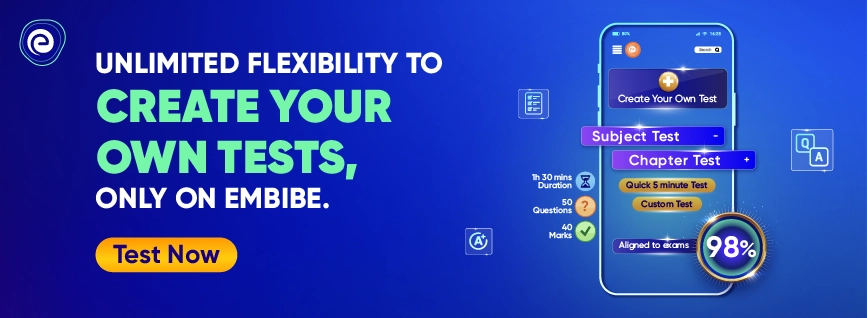- Written by nikhil
- Last Modified on 6-12-2024
About Rajasthan Board Class 6 Exam 2025
The Board of Secondary Education Rajasthan (BSER) is an education board accountable for offering high-quality education in Rajasthan and aims to provide academic excellence to support students attain their career goals. There are more than 6,000 schools situated in 32 districts of Rajasthan. These schools are affiliated with the BSER board, and around 10 lakh students are studying in them.
BSER originated on December 4, 1957, in Jaipur. However, it was shifted to Ajmer in 1961. BSER is likely to conduct class 6 exams every year in the last week of March or the first or second week of April. The RBSE class 6 syllabus is meant to foster curiosity, inquisitiveness, and a desire to learn in students. The RBSE textbooks improve students’ grasp from the fundamentals to the advanced level. This page includes textbooks, syllabus, and example papers for class 6 Science, Mathematics, and Social Science.
Rajasthan Board Class 6 Exam Summary
Class 6 is a crucial year because it lays the groundwork for middle school lessons. The class 6 board exam will be held at the school level. There would be no prospect of failure in exams because they will be held at the school level. The board’s schedule and timetable will be released in February 2025, with exams beginning in March or April and lasting about a month.
The table below shows the details of the exam:
| Features |
Details |
| Exam Name |
Rajasthan Board Class 6 Examination |
| Conducting Body |
The Board of Secondary Education, Rajasthan (BSER) |
| Frequency of Conduct |
Yearly |
| Exam Level |
Class 6 |
| Mode of Exam |
Offline |
| Total Marks |
100 |
| Medium of Exam |
English, Hindi |
Rajasthan Board Class 6 Official Website Link
https://rajeduboard.rajasthan.gov.in/
Rajasthan Board Class 6 Exam Syllabus 2025
The RBSE Class 6 Syllabus serves as a road map with instructions to help students comprehend what will be studied during the year ahead and what will be required of them. The State Council Of Educational Research and Training (SCERT) curricular framework facilitates a child’s holistic development.
Every year, the Rajasthan exam board publishes the syllabus for all classes, from 1st to 12th. The syllabus contains all the necessary information for teachers and students. Students can study for the final exams and do well if they know the whole RBSE Class 6 syllabus. The Rajasthan Board class 6 syllabus for the different subjects is provided in this article.
RBSE Class 6 Maths Syllabus 2025
Maths is one of the most scoring subjects for students. Students should consider clarifying their doubts by referring to all the materials. To do so, students should always refer to the syllabus and based on that start their exam preparation. The RBSE Class 6 Maths focuses on helping students to strengthen their foundation.
| Chapter Number |
Chapter Name |
Topics |
| 1 |
Knowing Our Numbers |
Consolidating the sense of numbers up to 5 digits, size, estimation of numbers, identifying smaller, larger, etc.
Place value (recapitulation and extension), connectives: use of symbols =, <, > and use of brackets, word problems on number operations involving large numbers up to a maximum of 5 digits in the answer after all operations. This would include conversions of units of length & mass (from the larger to the smaller units), estimation of outcome of number operations.
Introduction to a sense of the largeness of, and initial familiarity with, large numbers up to 8 digits and approximation of large numbers) |
| 2 |
Whole Numbers |
Natural numbers, whole numbers, properties of numbers (commutative, associative, distributive, additive identity, multiplicative identity), number line.
Seeing patterns, identifying and formulating rules to be done by children. (As familiarity with algebra grows, the child can express the generic pattern.) |
| 3 |
Playing with Numbers |
Simplification of brackets, multiples and factors, divisibility rule of 2, 3, 4, 5, 6, 8, 9, 10, 11. (All these through observing patterns. Children would be helped in deducing some and then asked to derive some that are a combination of the basic patterns of divisibility.)
Even/odd and prime/composite numbers, Co-prime numbers, prime factorisation, every number can be written as products of prime factors. HCF and LCM, prime factorization and division method for HCF and LCM, the property LCM × HCF = product of two numbers. All this is to be embedded in contexts that bring out the significance and provide motivation to the child for learning these ideas. |
| 4 |
Basic Geometrical Ideas |
Introduction to geometry. Its linkage with and reflection in everyday experience.
Line, line segment, ray.
Open and closed figures.
Interior and exterior of closed figures.
Curvilinear and linear boundaries
Angle — Vertex, arm, interior and exterior,
Triangle — vertices, sides, angles, interior and exterior, altitude and median
Quadrilateral — Sides, vertices, angles, diagonals, adjacent sides and opposite sides (only convex quadrilaterals are to be discussed), interior and exterior of a quadrilateral.
Circle — Centre, radius, diameter, arc, sector, chord, segment, semicircle, circumference, interior and exterior. |
| 5 |
Understanding Elementary Shapes |
Measure of line segment
Measure of angles
Pair of lines
– Intersecting and perpendicular lines
– Parallel lines
Types of angles- acute, obtuse, right, straight, reflex, complete and zero angle
Classification of triangles (on the basis of sides, and of angles)
Types of quadrilaterals – trapezium, parallelogram, rectangle, square, rhombus.
Simple polygons (introduction) (Upto octagons regulars as well as non regular)
Identification of 3-D shapes: cubes, cuboids, cylinder, sphere, cone, prism (triangular), pyramid (triangular and square) Identification and locating in the surroundings
Elements of 3-D figures. (Faces, Edges and vertices)
Nets for cube, cuboids, cylinders, cones and tetrahedrons. |
| 6 |
Integers |
How negative numbers arise, models of negative numbers, connection to daily life, ordering of negative numbers, and representation of negative numbers on the number line. Children can see patterns, and identify and formulate rules.
What are integers, identification of integers on the number line, operation of addition and subtraction of integers, showing the operations on the number line (addition of negative integers reduces the value of the number) comparison of integers, ordering of integers. |
| 7 |
Fractions |
Revision of what a fraction is, fraction as a part of whole, Representation of fractions (pictorially and on number line), fraction as a division, proper, improper & mixed fractions, equivalent fractions, comparison of fractions, addition and subtraction of fractions (Avoid large and complicated unnecessary tasks). (Moving towards abstraction in fractions) |
| 8 |
Decimals |
Review of the idea of a decimal fraction, place value in the context of decimal fraction, interconversion of fractions and decimal fractions (avoid recurring decimals at this stage), word problems involving addition and subtraction of decimals (two operations together on money, mass, length and temperature) |
| 9 |
Algebra |
Introduction to algebra
Introduction to variables through patterns and through appropriate word problems and generalisations (example 5 × 1 = 5 etc.)
Generate such patterns with more examples.
Introduction to unknowns through examples with simple contexts (single operations) |
| 10 |
Data Handling |
What is data – choosing data to examine a hypothesis?
Collection and organisation of data – examples of organising it in tally bars and a table.
Pictograph – Need for scaling in pictographs interpretation & construction.
Making bar graphs for given data interpreting bar graphs. |
| 11 |
Mensuration |
Concept of perimeter and introduction to area
Introduction and general understanding of perimeter using many shapes. Shapes of different kinds with the same perimeter.
Concept of area, Area of a rectangle and a square Counter examples to different misconceptions related to the perimeter and area.
Perimeter of a rectangle – and its special case – a square. Deducing the formula of the perimeter for a rectangle and then a square through pattern and generalisation. |
| 12 |
Ratio and Proportion |
Concept of ratio
Proportion as equality of two ratios
Unitary method (with only direct variation implied)
Word problems |
| 13 |
Symmetry |
Observation and identification of 2-D symmetrical objects for reflection symmetry
Operation of reflection (taking mirror images) of simple 2-D objects
Recognising reflection symmetry (identifying axes) |
| 14 |
Practical Geometry |
Constructions (using Straight edge Scale, protractor, compasses)
Drawing of a line segment
Construction of circle
Perpendicular bisector
Construction of angles (using protractor)
Angle 60°, 120° (Using Compasses)
Angle bisector- making angles of 30°, 45°, 90° etc. (using compasses)
Angle equal to a given angle (using compass)
Drawing a line perpendicular to a given line from a point a) on the line b) outside the line. |
RBSE Class 6 Science Syllabus 2025
The RBSE class 6 Science textbook was written in comprehensible language with the goal of making the textbook clear and understandable. The Rajasthan Board class 6 Science syllabus establishes the groundwork for the textbook by including images and a variety of activities to help students absorb the information included in them.
Familiarising the RBSE Class 6 Science syllabus and studying for the exams based on it would help pupils in performing well. It is a student’s guide to navigating through the course requirements. The following are some of the advantages of using the syllabus:
- Assists you in developing an excellent study schedule.
- It assists you in understanding what is expected of the students during the course.
Given below is the RBSE Class 6 Science Syllabus 2025:
| Chapter Number |
Chapter Name |
Topics |
| 1 |
Food |
Sources of Food
What are the various sources of our food?
What do other animals eat? |
| 2 |
Components of Food |
Components of Food
What is our food made up of?
Why do we eat a variety of food? |
| 3 |
Fibre to Fabric |
Materials of daily Use
What are our clothes made of?
How did people manage when there were no clothes?
Are some of our clothes made of materials obtained from plants?
In what kinds of places do these plants grow?
Which parts of the plants are used for making clothes? |
| 4 |
Sorting Materials and Groups |
What kinds of things do we see around us? |
| 5 |
Separation of Substances |
Cleaning Food
How do we separate the grains after harvesting the wheat/rice crop? |
| 6 |
Changes Around Us |
How do things change/react with one another?
In what ways do things change on being heated?
Do they change back on being cooled?
Why does a burning candle get shorter?
How much salt can be dissolved in a cup of water? |
| 7 |
Getting to Know Plants |
Plants – Form and Function
What is the structure and function of various parts
of the plants – stem, leaf and roots?
How do different flowers differ from one another?
How does one study flowers? |
| 8 |
Body Movement |
Animals – Form and Function
What is inside our bodies?
How do animals move?
Do all animals have bones in their bodies?
How do fishes move and birds fly?
What about snakes, snails, earthworms? |
| 9 |
The Living Organisms and Their Surroundings |
Things Around Us
Are all things around us living?
What is the difference between living and non-living?
Are all living things similar?
Do all living things move?
Where do plants and animals live? Can we grow plants in the dark?
The habitat of the living
How does habitat affect plants and animals?
How do fish live in water? |
| 10 |
Motion and Measurement of Distances |
Moving
How did people travel from one place to another
in earlier times?
How did they know how far they had travelled?
How do we know that something is moving?
How do we know how far it has moved? |
| 11 |
Light, Shadows and Reflections |
Rain, Thunder and Lightning
Where does rain come from?
How do clouds form?
Which are the things we can see through?
When are shadows formed?
Do you get a shadow at night – when there is no light in the
room, no moonlight or other source of light?
What colour is a shadow?
On what kinds of surfaces can we see images? |
| 12 |
Electricity and Circuits |
Electric Current and Circuits
How does a torch work?
Do all materials allow current to flow through them? |
| 13 |
Fun with Magnets |
Magnets
What is a magnet?
Where on a magnet do things stick?
How is a magnet used to find direction?
How do two magnets behave when brought close to each other? |
| 14 |
Water |
Importance of Water
What will happen to soil, people, domestic animals, rivers, ponds and plants and animals if it does not rain this year?
What will happen to soil, people, domestic animals, plants and animals living in rivers and ponds, if it rains heavily? |
| 15 |
Air Around Us |
Importance of Air
Some animals and plants live in water; some live on land and some live in upper layers of soil; but all need air to breath/to respire. |
| 16 |
Garbage In, Garbage Out |
Waste
Do you throw away fruit and vegetable peels and
cuttings?
Can these be reused?
If we dump them anywhere, will it harm the surroundings? What if we throw them in plastic bags? |
RBSE Class 6 Social Science Syllabus 2025
The Rajasthan Board has established the syllabus for Social Science class 6. The RBSE syllabus for Social Science is mainly divided into three parts- History-Our Past, Earth- Our Habitat and Social and Political Life. The curriculum defines all key themes, such as Our Universe, Solar System, Globe, and Maps, as well as their subtopics and concepts. The syllabus contains detailed information about the course as well as time frames for each topic. The RBSE Class 6 Social Science Syllabus serves as the foundation for textbooks and question papers.
History- Our Past
| Chapter Number |
Chapter Name |
Topics |
| 1 |
What, Where, How and When? |
The time frame under study
The geographical framework
Sources |
| 2 |
From Hunting – Gathering to Growing Food |
Hunting and gathering as a way of life, its implications
Introduction to stone tools and their use
Case study: the Deccan |
| 3 |
In the Earliest Cities |
The settlement pattern of the Harappan civilisation
Unique architectural features
Craft production
The meaning of urbanism
Case study: the North-West |
| 4 |
What Books and Burials Tell Us |
The First Farmers and Herders
Implications of farming and herding.
Archaeological evidence for crops, animals, houses, tools, pottery, burials, etc.
Case study: the North-West, and North-East |
| 5 |
Kingdoms, Kings and an Early Republic |
The expansion of the empire |
| 6 |
New Questions and Ideas |
Upanishads
Jainism
Buddhism |
| 7 |
Ashoka, The Emperor Who Gave Up War |
The First Empire
The expansion of the empire
Asoka
Administration |
| 8 |
Vital Villages, Thriving Towns |
Life in towns and villages
The second urbanisation
Agricultural intensification
Case study: Tamil Nadu |
| 9 |
Traders, Kings and Pilgrims |
Contacts with Distant lands
The Sangam texts and long distance exchange
Suggested regions: the Tamil region, extending to south east Asia and the west
Conquerors from distant lands: north western and western India
The spread of Buddhism: north India to Central Asia |
| 10 |
New Empires and Kingdoms |
Political Developments
Gupta empire and Harshavardhana
Pallavas and Chalukyas |
| 11 |
Buildings, Paintings and Books |
Culture and Science
Literature, including the Puranas, the epics, other
Sanskrit and Tamil works
Architecture including early monasteries and temples, sculpture, painting (Ajanta); Science |
The Earth- Our Habitat
| Chapter Number |
Chapter Name |
| Chapter 1 |
The Earth in the Solar System |
| Chapter 2 |
Globe Latitudes and Longitudes |
| Chapter 3 |
Motions of the Earth |
| Chapter 4 |
Maps |
| Chapter 5 |
Major Domains of the Earth |
| Chapter 6 |
Major Landforms of the Earth |
| Chapter 7 |
Our Country – India |
| Chapter 8 |
India Climate Vegetation and Wildlife |
Social and Political Life
| Chapter Number |
Chapter Name |
| Chapter 1 |
Understanding Diversity |
| Chapter 2 |
Diversity and Discrimination |
| Chapter 3 |
What is Government |
| Chapter 4 |
Key Elements of a Democratic Government |
| Chapter 5 |
Panchayati Raj |
| Chapter 6 |
Rural Administration |
| Chapter 7 |
Urban Administration |
| Chapter 8 |
Rural Livelihoods |
| Chapter 9 |
Urban Livelihoods |
RBSE Class 6 English Syllabus 2025
Let’s see the chapters of Class 6 English Main book – Honeysuckle:
| Unit Number |
Unit Name |
| Unit 1 |
Who Did Patrick’s Homework? |
| A House, A Home |
| Unit 2 |
How the Dog Found Himself a New Master! |
| The Kite |
| Unit 3 |
Taro’s Reward |
| The Quarrel |
| Unit 4 |
An Indian – American Woman in Space: Kalpana Chawla |
| Beauty |
| Unit 5 |
A Different Kind of School |
| Where Do All the Teachers Go? |
| Unit 6 |
Who I Am |
| The Wonderful Words |
| Unit 7 |
Fair Play |
| Unit 8 |
A Game of Chance |
| Vocation |
| Unit 9 |
Desert Animals |
| What if |
| Unit 10 |
The Banyan Tree |
RBSE Class 6 English Syllabus: A Pact With The Sun
Class 6 English Supplementary Reader – A Pact With The Sun has specific learning materials. Therefore, students must prepare for it accordingly. Given below are all the chapters that the students must prepare from A Pact With The Sun:
| Chapter Number |
Chapter Name |
| 1 |
A Tale of Two Birds |
| 2 |
The Friendly Mongoose |
| 3 |
The Shepherd’s Treasure |
| 4 |
The Old-Clock Shop |
| 5 |
Tansen |
| 6 |
The Monkey and the Crocodile |
| 7 |
The Wonder Called Sleep |
| 8 |
A Pact with the Sun |
| 9 |
What Happened to the Reptiles |
| 10 |
A Strange Wrestling Match |
RBSE Class 6 English Grammar Syllabus:
The RBSE Class 6 Grammar Syllabus is further divided into two sections:
English Grammar: This section of the course focuses on improving one’s language skills. It covers fundamental principles like the use of verbs, adjectives, helping verbs, pronouns, nouns, and so on. The portion also teaches students how to construct good sentences so that they can communicate effectively in the world’s second most spoken language.
Applied Grammar: This part is intended with real-world applications of the English language in mind. The section contains information that can aid in the development of effective oral communication skills. Sections such as gap filling help students enhance their decision-making skills when it comes to creating a phrase. The editing component of applied grammar assists students in replacing incorrect statements or language development with proper ones. It strengthens one’s grammatical judgement.
Let’s see the syllabus for English Grammar for these two sections.
| Sl. no |
Class 6 English Writing Section Syllabus |
| 1 |
Formal Letter |
| 2 |
Informal Letter |
| 3 |
Diary Entry |
| 4 |
Notice Writing |
| 5 |
Message Writing |
| 6 |
Debate |
| 7 |
Speech |
| 8 |
Article |
| 9 |
Report |
| 10 |
Story Completion |
Rajasthan Board Class 6 Study Plan to Maximise Score
Having a preparation strategy is extremely crucial as it helps the students stay ahead of their peers. Students in RBSE Class 6 must have a strong preparation strategy so that they can kickstart their exam preparation. It is important that the students realise the basics of how to prepare an exam strategy which will eventually lead to scoring high marks in the exams. In the sections below, we have provided the preparation tips and a detailed study plan for RBSE Class 6 students.
RBSE Class 6 Preparation Tips 2025
For your RBSE class 6 final exams, prepare mentally to take the test. Don’t freak out. “Well begun is half done,” they say. Start preparing from the beginning. Manage your time by categorising it as studying, reviewing, or practicing. You can excel in your tests by following a few simple measures. We have compiled ten golden recommendations uniquely suggested by educational experts.
- Write Down What You Learn
Make a habit of writing down your topic once you’ve mastered it. Experts advise that you try to write things down quickly. This habit of writing down a topic will allow you to assess how much time you are devoting to it. It will eventually assist you in managing your time during your exam.
Rather than obsessing about textbooks and notes, your slogan should be “Eat, Sleep, Study, and Relax.” Recall what topics you learned for the day while you are and lying in your bed before going to sleep. Also, determine which lessons require additional attention so that you may arrange your study for the next day.
Studying in a group allows you to gain different perspectives from your classmates. This procedure improves your learning experience. In a group study, you share materials, engage with team members, and exchange ideas. This practice will make your learning fun and attractive.
- Watch a Documentary on the Topic
To understand a subject quickly and easily, try watching a video of the class or topic you are studying. Visual aids in the retention of information. Video tutorials allow you to learn in a fun and engaging way through animated movies, interactive study with mentors, and adaptive learning techniques.
- Don’t Stay Up All Night Before Exam
Take it easy the day before your exam. Examine and re-examine all essential topics. Focus on the most important concerns. Eat a proper dinner and go to bed at a reasonable hour. Before going to bed, prepare your stationery, exam admit card, and clothes for the next day. With these tips, you should practice more and prepare for the big day.
RBSE Class 6 Detailed Study plan
Here you will find an appropriate itinerary for students preparing for their +2 examinations and also taking tuition on a daily basis, as well as for those who do not attend tuition and instead undertake self-study.
Remember to keep everything in mind and stick to your regular regimen. We have provided you with a timeline that you can use.
5.00 am – You should get up by 5.00 a.m. and complete your daily tasks by 5:15 a.m.
5.15 am to 5.30 am – Go to the terrace and take in some fresh air while doing some yoga or meditation to start your day off right (If it is not possible to go to the terrace, then find some peaceful area and walk for a few minutes and do meditation there). These kinds of physical exercises are critical for your mental health.
5.30 am to 6.45 am – Go over everything you read the night before.
6.45 am to 7 am – Take a shower every day. It is critical to stay hydrated throughout the day. Have a healthy breakfast, and don’t forget to include juice and fruits. It gives you more energy to do all of your chores.
We’re hoping you’ll be home from school by 3:00 p.m. When you get home, change your clothing, freshen up, and rest for 20 to 30 minutes.
Rajasthan Board Class 6 FAQs
Given below are some of the frequently asked questions on Rajasthan Board Class 6 exams:
Q. When will BSER conduct the Class 6 exams?
Ans: The Rajasthan Board (BSER) is likely to conduct the class 6 exams in the last week of March or in the first week of April 2025.
Q. What is the official website of RBSE?
Ans. The following link takes you to the official website of RBSE: https://rajeduboard.rajasthan.gov.in.
Q. What is the full form of RBSE?
Ans. The full form of RBSE is Rajasthan Board of Secondary Education. It is responsible for governing examinations, including Secondary and Senior Secondary and other competitive examinations.
Q. Where can I find the Rajasthan Board Class 6 syllabus?
Ans. Students can find the Rajasthan Board Class 6 syllabus on this page.
Q. What is the exam fee for regular students?
Ans. A cost of Rs.450/- is charged for the examination. Experimental fees for experimental subjects are charged separately at a rate of Rs.50/– per subject. A fee of Rs.450/– will be charged for each additional topic.
RBSE List of Educational Institutions
Below are some of the schools in Rajasthan.
| No. |
Name of School |
| 1 |
Government Jawaher Senior Sec. School |
| 2 |
Government Oswal Jain Sr.Sec. School |
| 3 |
Government Rajender Senior Sec. School |
| 4 |
Government Mahatma Gandhi Senior Sec. School |
| 5 |
Government Senior Sec. School, Topdara |
| 6 |
Government Senior Sec. School, Police Line |
| 7 |
Government Sindi Senior Sec.School, Khari Kui |
| 8 |
Government Center Girls Se.Sec. School |
| 9 |
Government Girls Se. Sec. School, Gulabbar |
| 10 |
Government Girls Se. Sec. School, Nagra-Bhajanganj |
To access the complete list of schools in Rajasthan, click here.
RBSE Future Exams After Class 6
Future Exams: In order to be promoted to the following class, all class 6 pupils must pass a school-level examination. Students in class 6 are promoted to class 7 depending on the results of the Continuous Comprehensive Evaluation (CCE).
Aside from this school-level exam, numerous additional competitive exams are held on a national and international scale. These exams are one method of revealing pupils’ interests, capabilities, knowledge, and potential. The following are some of the competitive tests in which class 6 pupils may participate:
- The Unified Council organises the National Level Science Talent Search Exam (NSTSE) for students in grades 2 through 12. It is one of the most well-known scholarship examinations in India.
- The Science Olympiad Foundation (SOF) organises several Olympiads, including IMO, NCO, NSO, and ISO. They only happen once a year and are fiercely competitive. (Olympiads)
- International Drawing Olympiad (IDO)
- GeoGenius, a non-profit organisation founded by leading academics, aims to increase school children’s understanding of geography. It also teaches them about the planet and inspires deep love and respect for the environment, which aids in their growth.(GeoGenius)














































